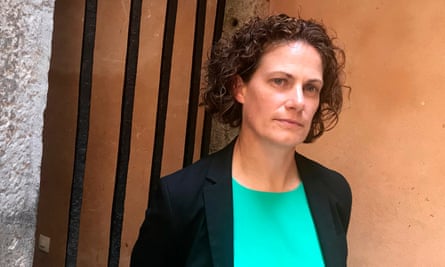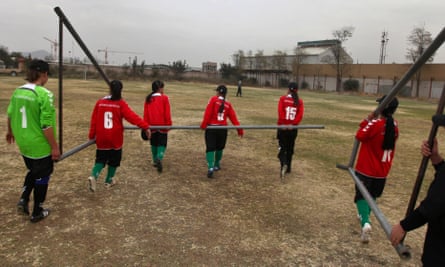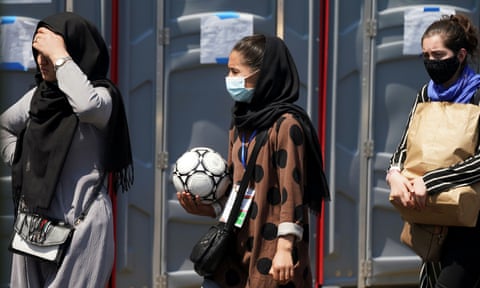“We have been working like fingers on one hand, with different roles, and we came together as a big strong punch,” says the former captain and one of the founders of the Afghanistan women’s national football team, Khalida Popal. She is talking about the small team that pulled off the mission to evacuate 100-200 Afghan athletes and a number of individuals connected to them from the Hamid Karzai international airport in Kabul.
Across a two-week period those fingers worked tirelessly around the clock and across numerous time zones, tracking the real-time movements of the Taliban and military personnel on the ground to pull off what seemed completely impossible: to get a group of female football players, many teenagers, and a host of others, including family members, into the airport and on to planes.
Who is this motley, but multitalented, crew and how did they manage to get so many out where many more failed? This is their story.
Kat Craig, the human rights lawyer working for international players’ union Fifpro, does not have a Bat phone but the former US international and head coach of the Afghanistan women’s national team, Kelly Lindsey, jokes that she should have. On the day the Taliban came, the Fifpro general secretary, Jonas Baer-Hoffmann, got in touch with Popal, who had been fielding distressing and desperate calls from her former teammates and had been encouraging them to burn shirts and hide evidence of them having played football.
Shortly after, he looped in Lindsey and brought in Craig, who had also worked with Fifpro to support Afghanistan players with their sexual abuse case against the president of the Afghanistan FA in 2018, and the team of four swung into action. The messages from players from Popal were bleak.
“Many were really panicked. One said: ‘I took my brother’s gun, I am sitting in front of my window, watching outside and I have not slept. When the Taliban knock on my door I will shoot myself in my head because I prefer to kill myself than be caught by the Taliban.’”
The four held a first strategy meeting on Monday 16 August, three days after the Afghanistan government surrendered to the Taliban, but they had been messaging over the weekend, coming to terms with the situation and strategising. They went into their meeting knowing they had to get female players out. “We thought we had 24 to 48 hours so we were working our butts off from that moment to make things happen straight away,” says Lindsey.
That, according to Craig, was key. “We had no idea how things would change. So we just decided to treat every 24 hours as though it was the last 24 hours and to do as much as we could,” she says. “Initially, we identified four people as the most vulnerable.
“Thanks to Khalida, we were able to get intelligence early on that there were certain players who are very public and very, very vocal women’s rights activists that would be easily traceable and were specifically at-risk. In many cases traditional factions in their neighbourhoods, even before the Taliban had retaken Kabul, were really opposed to them.
“As the Taliban get closer, you have all of these traditionalist factions that kind of start merging with the Taliban. At this point, we knew that the information, including location of individuals, would be shared. Then we got concrete confirmation that they were knocking on people’s doors.”

The players had to hide and stay on the move while the remote team got going. The speed of the response was critical and “the other thing that I think was a really important strategy,” says Craig, “was not to work consecutively, but to work concurrently.
“It was not scattergun. This is a crisis and it was an intentional tactic bearing in mind the volatility and unpredictability of the situation, where we just said: ‘OK, in circumstances where you don’t know how your opponent’s going to act, you try and find as many different alternatives as possible.’”
Then they began monitoring. They tracked everything. Craig scoured human rights and women’s equality groups and even reached out to former military personnel she had been opposite in the courtroom. Baer-Hoffmann pulled on every connection through Fifpro that he could and they all watched out for announcements from governments who were evacuating beyond their own citizens to identify countries they could focus their efforts on. The US, Canada, Belgium, Germany, the UK and Australia were all avenues they pursued as they tried to get the names of the women on as many evacuation lists as possible.
Once they had players on lists, they needed to get to the senior military and government personnel that could bump them up. “That was quite a difficult moral reflection,” Craig says. “But our priority girls were probably some of the highest-risk women in the country. Then the rest of the national team for sure were at-risk too.
“If you go back to the time that Khalida founded it, they used to have to train on a military base. In 2011 or 2012, there was a bombing at the base at the exact time that they were supposed to be playing football. After that, they never trained in the country, even before the Taliban regained power, because it was so dangerous. They’d never played a single one of their home games in the country.
“It’s not immediately evident but they were a symbol of resistance against traditional values espoused by the Taliban, that’s why Khalida had to flee the country [in 2011],” she explains. “Then, of course, came the sexual abuse case. These cases brought changes in the Afghan criminal justice system, and changes in the public discourse. Women who had previously been blamed for being raped were saying ‘hang on a second’ because the footballers have spoken out. So they were marked women in many ways.
“Now, of course, those changes are moot, the progress made has been lost because the Taliban are back.”
The first major turning point was connecting with a group in Australia who were also working with athletes. The former Olympian and human rights lawyer Nikki Dryden, who Craig knew, and the director of Human Rights for All, Alison Battisson, grew the team. They had the former Socceroo Craig Foster, who led the campaign to save Bahraini footballer Hakeem al-Araibi, on board. Through another former Olympian and member of the Australian parliament, Zali Steggall, they were able to get visa applications in for athletes.
Battisson lodged multiple immigration cases and Steggall provided a cover letter. “The idea was that as they got to the front of the gates, they would show the Zali letter and then we had a Fifpro letter and we had a letter from Fifa,” explains Craig. “Then the players could use them to show that they were legitimately at risk, but we didn’t know whether that would work.”
Players travelled to the airport with documents stuffed in their underwear, brightly coloured scarves to be used as makeshift flags if needed, and their money split up and hidden in different places on them. They were told “if the Taliban asks you at the checkpoint what you’re doing, say your husband is inside and you’re really, really worried and he’s going to get very, very angry. If you don’t get in, panic about your husband being angry at you,” says Lindsey.

Once through the checkpoints, attempting to get inside and to the gates became key. Haley Carter, a former US marine who served two tours of Iraq and was Lindsey’s assistant coach with the Afghanistan women’s team, says that “Khalida describes it well when she talks about five fingers that came together in a punch.
“Everyone on our team had a role to play. I’m the problem solver of the group. Kelly’s the positive one, the diplomat, and Khalida helps manage the players and then some. Then when we got connected with Kat, Nikki and Alison we all just sort of fell into things seamlessly.”
Carter reached out to her former military contacts. She says: “There’s so many veterans right now having conversations about things happening on the ground, in real time. We were able to share information in real time with one another. I knew where the Taliban checkpoints were, I had grid coordinates and then I could relay them along and send a pin to our players.”
The best time to get through the Taliban checkpoints was at 3-4am but there were thousands of people trying to get through. It was the same with the gates around the airport perimeter. Eventually they got three key people, an Australian, a Briton and an American, in the airport – each in contact with boots on the ground.
Lindsey explains: “We were awake all night, sending messages to players which said: ‘The guard’s going to change in one hour, the Brits are going to be on the ground, here’s the contact, push! You have one hour to get to the front!’”
Craig says to Lindsey: “I don’t know how you survived it, because it properly upsets me. Messages like: ‘Coach, help us, help us.’ And we were like: ‘You just have to push. Get your biggest defender and your quickest winger, you just have to get to the front.’ They were being beaten up, being whipped and the Taliban were out there with electric cattle prods. And we said to them: ‘You have to get to the front, you have to go.’ I remember you said to them: ‘You are fucking champions. This is when you have to go, do your thing, you gotta go’ – and eventually they made it to the front.
“Every now and again, someone would say: ‘Nope, papers aren’t good enough’ and we’d have everyone on the phones and you would keep telling the players: ‘Don’t leave, advocate for yourself, keep arguing, keep talking, keep fighting – stay in that room.’ They had to go through an open sewer. They were having to climb over it and we were getting people to fish them out.”

Popal told Lindsey she channelled her coaching slogans to get the players through. “She said: ‘Remember when you’d say: Together unbreakable, we can do this, we can be champions! I was living all your speeches and just texting people: one team, one unit! Passion, pride, never quit, go go go, you can do it!’ She told me that this morning. I was dying laughing.”
It was the “toughest part” says Popal. “Some of our players were 16, 17, 18 years old. Some spent three nights outside the airport in the hands of the Taliban. Some were stuck at the checkpoints. They were scared. They’re teenagers. They were beaten with guns and whips on the head – some of them were injured. Some had the Taliban shooting at them. They were lucky.
“I would say: ‘Listen, no matter what, we will not leave our people behind. We will not leave our bodies behind. We’ll do everything possible to stay as a team together.’ At that time I didn’t give a shit about football but I was telling them: ‘This is a football game. We are in the Champions League, we are in the final, we are going to win this. For us, our trophy is to get to the gate.’”
There were uplifting stories that would keep them going too, says Carter. “One of our players managed to make it through but her two siblings were stuck outside for two days and we worked so hard, using selfies of what they looked like, their grid coordinates, coming up with a signal, making sure we had a copy of their passports.
“We had almost given up on it. About five minutes before our flight took off on 23 August, one of our contacts in the airport called the gate, someone saw these two kids and pulled them in. We got word we were able to get those two siblings inside five minutes after the aircraft went wheels up.
“Of course they had not been on the list so we immediately had to start working on visa applications for them. They processed them and put them on the very next flight to Dubai. About 24 hours later the player saw them walking towards her in Dubai and that’s how she found out that we were able to get them out – she couldn’t believe it.”
The player was part of the biggest group that got inside the airport with check marks on their hands, without knowing what would happen next. In the early hours of 23 August there were 77 of them on that plane bound for Australia, with a stop in Dubai.
The rules to get into the airport kept changing: suddenly a pending visa was not enough and it had to be approved, suddenly unaccompanied minors needed parental consent despite some having lost both their parents. “It was just constant: you saw the hurdle, new hurdle, saw the hurdle, new hurdle, but we just kept going,” says Craig.
The question of whether they would succeed never popped into her mind. “What we never thought is: we can’t do it. We didn’t know how, we didn’t know if, we didn’t know when, but we didn’t assume that we couldn’t do it. That’s the champion mindset that comes, I think, from working with elite athletes.”
It got harder and harder to get people through but when the first suicide bombing took place the route dried up and, last Thursday, they got word that the gates were being welded shut.

Lindsey says: “We told everyone: ‘Listen, we don’t know what’s happened but it’s very dangerous, we encourage you not to go to the airport now.’ We had messages from people that basically said: ‘I’m going to die at home or I’m going to die in the airport so I’m going.’ So we said: ‘Well, let us help you then’.
“Some people made it in without telling us; some people didn’t. Nobody was affected by that suicide bombing, which is good, because the Abbey Gate is where all of our people got through after day one.”
Having started with four key names, the team had helped women footballers, Paralympians, Invictus athletes, martial artists, judges, a woman working in the field of sexual abuse trauma, journalists who had reported on women’s football, teachers in the ministry of education, and family members of some. But it will never feel like enough.
“We always knew that plan A would not fully succeed,” says Craig. Lindsey says: “We’ve been strategising for phase two, phase three from the beginning. Khalida and I were already talking about the next step because they were not all going to get through the airport.”
The fight to protect those left behind continues, but the two weeks of intense round-the-clock working took its toll on all, particularly on Popal, who, in her own words, “acted as the No 10” in an acutely personal situation, juggling the players and those working to get them out, and fielding calls from people wanting to help. She didn’t sleep, she didn’t eat and eventually she collapsed. “I didn’t eat but I didn’t feel hungry. I didn’t drink but I didn’t feel thirsty. I think all my feelings in my body were forgotten,” she says. “The only thing that was actually working in my brain was how to help them survive.
“I stood up from my desk and came into the hallway and I fainted. Everything was dark, I opened my eyes and I found the two people from the emergency services with an oxygen mask on my face and my boyfriend, scared and worried. I could not move, I could not breathe, I was trying to scream, I could not scream, I could not talk.”
She thinks it was a panic attack. Her hands and legs are still shaking from a lack of food and rest. She still feels weak. People are encouraging her to rest but “when you know that people are waiting for you and their only hope is your voice you cannot think about yourself”.
Having lived under the Taliban she knows what is at stake.
“I had to tell players they needed to choose which family member to take with them,” she says. “It was awful. My voice was shaking. I said: ‘Listen, my beautiful sisters. I understand. I understand how tough it is. I made this call many years ago. To survive. I left my family behind. I know how painful it is’.
“When I left my country my grandfather said: ‘you’re not coming back, right? We will not meet each other again,’ and he started crying. He was my role model. My grandfather was a feminist, and he was the love of my life.
“When I looked into his eyes I was not able to say goodbye. I said: ‘Listen, we will meet again,’ knowing that I couldn’t. I lost my grandfather and never managed to see him. Every time he would say to me on the phone: ‘You promised that we will meet again.’
“Everything is repeating itself. These young girls, they are so beautiful and young, it’s just so unfair what is happening to them. It’s so unfair.”
